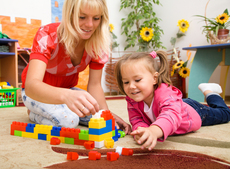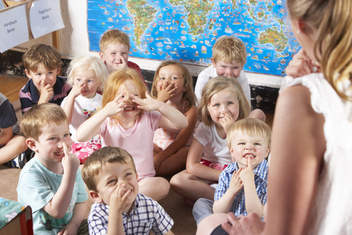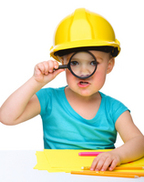
How is a parent supposed to know what preschool is the best fit for their child who has only been alive for 2+years? With their interests changing from week-to-week; let alone their personality, it can be one of the most overwhelming school experience you will have to be faced with. How can you trust a complete stranger to love, protect, understand and educate the most precious thing to you? At least when choosing a college for your 18 year-old, you have an idea what they are interested in pursuing, understand their strengths and weaknesses, can research which college has the best program for them and for the most part they are independent.
If choosing a preschool was more like choosing a college, I would research preschools around the East Bay that have a thriving program in cars, trucks, boats, airplanes and dirt! Instead of finding a preschool program that only focuses on vehicles every day of the week, I have to understand how to find the right Preschool Philosophy that would give my son a positive learning experience and would foster his love for learning. Research now proves that the first 5 years of life is the most crucial for brain development/learning and by having a positive learning experience early on will continue to lead children down a path to become a lifelong learner.
With so many preschools in the East Bay, where does one start?
Now that you have your starting point in your preschool search, here is a “basic” overview of the most common Preschool Philosophies-these are basic overviews of philosophies, please continue to do further research on your own. Some schools may also incorporate a few of these philosophies within their program:
Overall, the best advice I can give any parent is to follow your instincts while touring different preschool programs. There are so many great programs in the East Bay and most likely you will like certain aspects from each school you visit, but the number one thing is to realize that if you have a great feeling about a preschool program then your child will feel the same. If you are hesitant about a program do not send your child there as your anxiety and emotions will heavily influence their preschool experience. Also, don’t be afraid to try another preschool if the program doesn't work out for you or your child. Children are way more resilient than we give them credit for. Don't over think. They will be fine.
Remember that your child is only a child once so their preschool experience should be filled with positive influences and learning experiences.
If choosing a preschool was more like choosing a college, I would research preschools around the East Bay that have a thriving program in cars, trucks, boats, airplanes and dirt! Instead of finding a preschool program that only focuses on vehicles every day of the week, I have to understand how to find the right Preschool Philosophy that would give my son a positive learning experience and would foster his love for learning. Research now proves that the first 5 years of life is the most crucial for brain development/learning and by having a positive learning experience early on will continue to lead children down a path to become a lifelong learner.
With so many preschools in the East Bay, where does one start?
- Considered what values are important to you and your partner: academics, play-base, parent participation, religion, etc
- Observe your child’s personality and energy level. Would they be successful in a structure environment? Would they learn best through play? Can they focus better in a busy or quiet environment?
- Ask your friends or other parents for recommendations.
- Think about the type of questions you would like to ask the preschool.
- Understand the different types of Preschool Philosophies and choose one that matches you and your child’s educational values.
Now that you have your starting point in your preschool search, here is a “basic” overview of the most common Preschool Philosophies-these are basic overviews of philosophies, please continue to do further research on your own. Some schools may also incorporate a few of these philosophies within their program:
- Play-Based/Child-Directed: Children will have the freedom to engage in activities that interest them within the different interest areas in the classroom. In a play-based environment, children are learning social skills, turn taking, problem solving, etc while the teachers are taking advantage of teachable moments throughout the day.
- Developmentally Appropriate: Children are exposed to materials within their environment that are developmentally and age-appropriate. Teachers expose children to developmentally appropriate materials/curriculum and has the understanding that every child learns at their own pace.
- Academic-Based: Children are in a structure environment that is teacher-directed. The curriculum is often focus in getting children ready for Kindergarten: early reading, writing, math, etc.
- Montessori: Child-center educational approach within a mixed age-group environment that encourages peer learning, uninterrupted work-time and guided choice of work activity. Teachers encourage children to initiate their own learning and the development of the whole child: physical, social, emotional and cognitive.
- Reggio Emilia: Children are seen as full potential learners who are competent and capable of building their own theories. The children, parents and teachers are all involved in the curriculum/on-going projects that are based on the child’s interest. Projects are documented daily using words, art, photographs, etc so that everyone can see the progression of the projects to give it meaning and identity to the children.
- Project-Based: Children learn in an interactive process where teachers are there to guide them through real-life experiences within their community/environment. Children work together on a project for an extended period of time investigating and responding to questions, problems, or challenges that come up along the way. Children also rely on their peer’s strengthens, weaknesses, interest, backgrounds and experiences in a hands-on learning environment.
- Waldorf: Children are seen as creative thinkers and doers. They learn with a set-routine with predictable structure and usually have the same teacher for multiple years. The environment is set-up to mimic a nurturing-home where it’s warm and friendly with natural materials. You will not find any computers or electronic within these environments.
- High/Scope: Children are seen as active learners while the teachers are there to participate as partners in their learning. Teachers emphasize on positive interaction strategies: sharing control with children, focusing on children’s strengths, forming authentic relationships, supporting children’s play ideas and adopting a problem-solving approach to social conflicts. The heart of High/Scope approach is the “plan-do-review” sequence in which children have to express what their plan is before going to an activity then carrying out their plan and finally reviewing/summarizing what they did to their peers.
- Co-op: In a cooperative program, parent participation is crucial to their child’s learning and preschool experience. There is usually one teacher who oversees the program, but the parents are the main ones helping out with varies duties throughout the day/school year.
- Religious: Schools that are sponsored by a church or other religious organizations. The curriculum and environment is influenced by their religion which can have a heavy or light influence in their daily activities.
- Language Immersion: Children are immersed and exposed to use a different language throughout the program. Some schools may be completely immersed in their language while other schools have set times within their daily schedule to immerse the children to learning a new language.
- Community: Are not-for-profit preschools. The majority of them are managed by the parents and community members. The committee makes all major financial, employment, planning and policy making decisions. Some community-based preschools can also be sponsored and managed by an organization, sometimes with advisory committees comprised of parents and community members.
Overall, the best advice I can give any parent is to follow your instincts while touring different preschool programs. There are so many great programs in the East Bay and most likely you will like certain aspects from each school you visit, but the number one thing is to realize that if you have a great feeling about a preschool program then your child will feel the same. If you are hesitant about a program do not send your child there as your anxiety and emotions will heavily influence their preschool experience. Also, don’t be afraid to try another preschool if the program doesn't work out for you or your child. Children are way more resilient than we give them credit for. Don't over think. They will be fine.
Remember that your child is only a child once so their preschool experience should be filled with positive influences and learning experiences.







 RSS Feed
RSS Feed